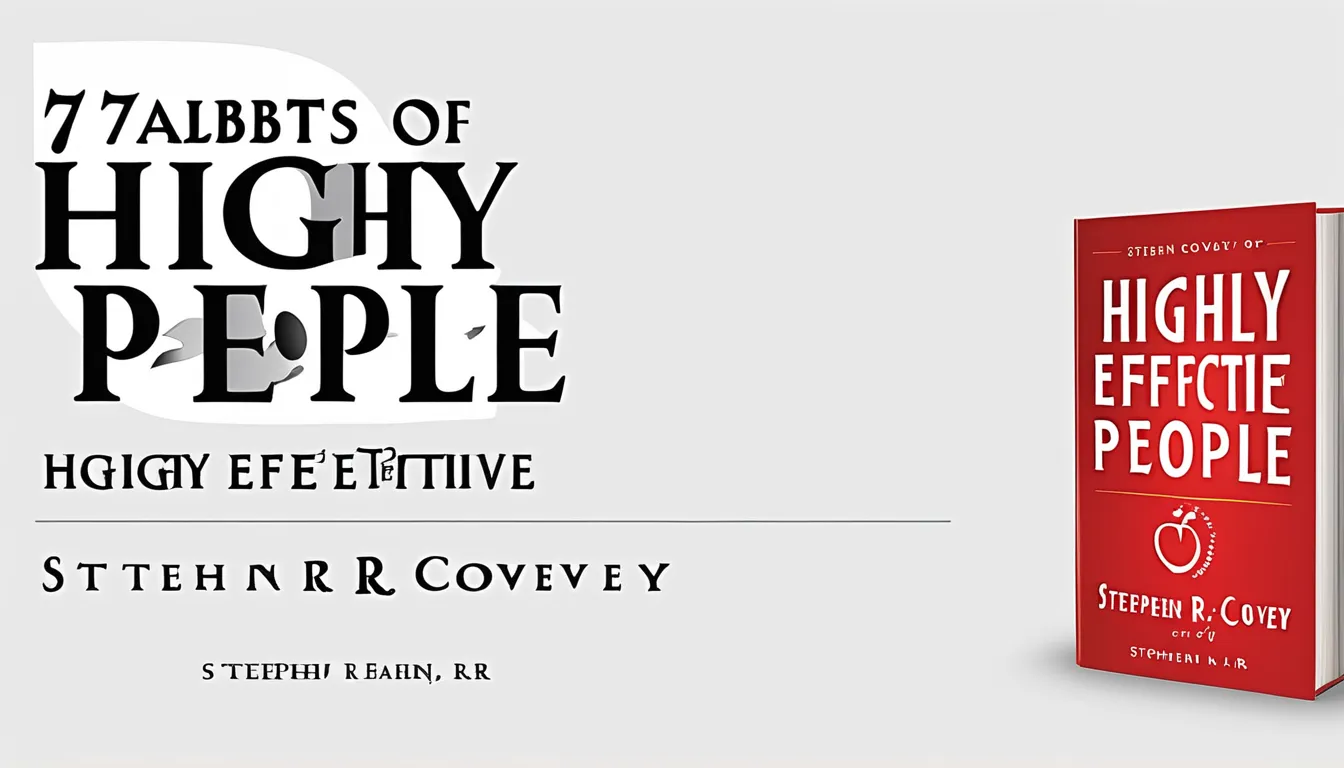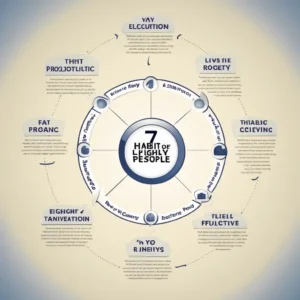The 7 Habits of Highly Effective People by Stephen R. Covey
Table of Contents:
- Introduction
- Principal Concepts
a. Be Proactive
b. Start with the End in Mind
c. Put First Things First
d. Think Win-Win
e. Seek First to Recognize, Then to Be Agreed
f. Synergize
g. Sharpen the Saw - Structure
- Important Functional Points
a. Character vs. Personality
b. Paradigm Shifts
c. Interdependence - Impact
- Conclusion
Introduction:
The timeless self-help ebook The 7 Habits of Highly Effective People: Powerful Lessons in Personal Change by Stephen R. Covey has encouraged tens of millions of people globally. It offers a principle-centred technique for agreeing on both personal and expert problems and was first published in 1989. Covey offers a series of behaviours that may be planned to change people from the inside out; these behaviours focus more on character development and long-term efficacy than on band-aid resolutions. The e-book’s ongoing popularity is a testament to its effectiveness and deep insights into human behaviour.

Principal Concepts:
- Be Proactive:
The first habit, Be Proactive, places interest in the need to accept accountability for your life. Covey adds that proactive persons know that they are answerable for their conduct, moves, and choices. Slightly than responding to outside events, individuals are conscious of their ability to choose their course of action, so crucial to their fate. “I am now not a man-made from my situations,” Covey writes. “I am what my selections have completed me.” - Start with the End in Mind:
This practice helps people recognize their ideal future and create actions that move them closer to it by custody clear objectives in mind. Covey highlights how vital it is to share your ideas and values while crafting an individual mission statement. People can ensure that their actions are in line with their long-term objectives and lead more satisfying and practical lives by starting with the end in mind. - Put First Things First:
Based on this habit, Covey presents the thought of time management, advising readers to order tasks according to importance rather than urgency. People can avoid the trap of always reacting to disasters and instead concentrate on activities that help them achieve their long-term goals by aiming at what truly matters. Covey’s time organization matrix, which divides tasks into four sections, is an applied tool for controlling this desire. - Think Win-Win:
In this habit, Covey promotes a mindset that looks for opportunities for both gatherings to benefit from every appointment. The win-win strategy places more emphasis on cooperation and the idea that there is plenty of victory to go around, rather than rivalry or compromise. According to Covey, partnerships constructed on mutual respect and confidence are more fulfilling and long-lasting. - Seek First to Understand, Then to Be Understood:
This habit revolves around effective communication. Covey highlights the value of empathic attending—understanding the other person’s perspective before offering your own. Arranging understanding helps people build stronger bonds with others, resolve conflicts more skillfully, and develop bottomless relationships. - Synergize:
The concept of synergy holds that the whole is better than the sum of its parts. Covey promotes teamwork and the blending of various skills, perspectives, and ideas to produce advanced explanations that might not be possible when at work alone. By valuing diversity and working together, individuals and collections can achieve remarkable results. - Sharpen the Saw:
Sharpen the Saw, the last habit focuses on unbroken development and self-renewal. For long-term efficacy, Covey recommends regular preservation of one’s physical, mental, expressive, and psychic well-being. This habit encourages individuals to take care of themselves to continue growing, reflecting, and acting at their best.
Structure:
These seven habits—each structure on the one before it—are the foundation of The 7 Habits of Highly Effective People. The ebook is separated into four sections:
- The first section presents the idea of personal morals and the need for a paradigm shift.
- The second section focuses on personal effectiveness (Habits 1-3).
- The third section deals with relational efficiency (Habits 4-6).
- The fourth section debates self-renewal (Habit 7).
Covey guides readers through each habit using a mixture of theory, real-world examples, and movements, making each chapter instructive and useful.
Important Functional Points:
- Character vs. Personality:
Character ethics, not character ethics, are the foundation of true success, according to Covey. Character traits like charm and social skills can help in the short term, but integrity, courage, and other crucial personal traits are what lead to long-term success. - Paradigm Shifts:
One of the ebook’s main ideas is the idea of a paradigm shift, which is an essential change in viewpoint. According to Covey, embracing new paradigms that are aligned with accepted principles is important for personal growth and efficacy. - Interdependence:
Covey emphasizes that transitioning from dependence to individuality and ultimately to interdependence is an essential part of maturity. When people collaborate and are interdependent, they can work together to their greatest possible and benefit from one another’s strengths.
Impact:
- The 7 Habits of Highly Effective People has had a main effect on guidance education and personal progress worldwide. It is now a keystone of the self-help movement, impacting not just individuals but also organizations and informative institutions.
- The book’s focus on long-term efficiency, moral leadership, and personal growth has resonated with readers of all ages, making it a go-to reserve for anyone seeking both professional and personal growth. Numerous organizations have implemented the principles discussed in this ebook to improve management, teamwork, and company culture.
Conclusion:
The 7 Habits of Highly Effective People by Stephen R. Covey is a model and principle-driven method for reaching both expert and personal effectiveness. Through the adoption of these seven habits, individuals can achieve their goals, convert their lives, and create deep connections. The ebook delivers a solid foundation for long-term achievement by focusing on ethical behaviour, continuous improvement, and personal growth. Regardless of your goals for your personal life, professional development, or leadership abilities, The 7 Habits of Highly Effective People offers valuable lessons that can help you become a more effective and fulfilled individual.
For further reading and sources associated with “The 7 Habits of Highly Effective People,” you can go to the [FranklinCovey website](https://www.Franklincovey.Com/the-7-habits.Html).

